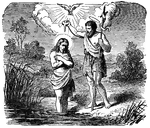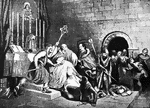Clipart tagged: ‘patron saint’

The Baptism of Jesus by John the Baptist in the Jordan River
"And it came to pass in those days, that Jesus came from Nazareth of Galilee, and was baptized of John…

Death of Becket
"Death of Becket. During the early years of the reign Thomas A. Becket, as the king's chancellor, had…